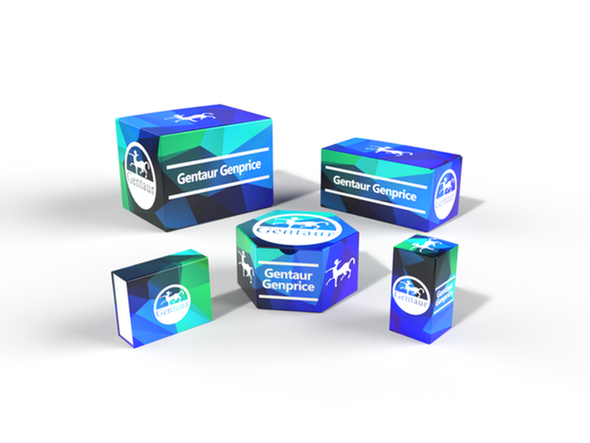Description
CX3CL1 Antibody | 2099 | Gentaur UK, US & Europe Distribution
Host: Rabbit
Reactivity: Human, Mouse
Homology: Predicted species reactivity based on immunogen sequence: Rat: (79%)
Immunogen: CX3CL1 antibody was raised against a peptide corresponding to 18 amino acids near the amino terminus of human CX3CL1.
The immunogen is located within amino acids 20 - 70 of CX3CL1.
Research Area: Infectious Disease, Innate Immunity, Chemokines & Cytokines
Tested Application: E, WB, IP
Application: CX3CL1 antibody can be used for detection of CX3CL1 by Western blot at 0.5 - 2 μg/mL dilution. CX3CL1 is ofen observed migrating at 80 - 100 kDa in SDS-PAGE, presumably due to post-translational modification.
Antibody validated: Western Blot in mouse samples. All other applications and species not yet tested.
Specificiy: N/A
Positive Control 1: Cat. No. 1285 - C2C12 Cell Lysate
Positive Control 2: N/A
Positive Control 3: N/A
Positive Control 4: N/A
Positive Control 5: N/A
Positive Control 6: N/A
Molecular Weight: N/A
Validation: N/A
Isoform: N/A
Purification: CX3CL1 Antibody is affinity chromatography purified via peptide column.
Clonality: Polyclonal
Clone: N/A
Isotype: IgG
Conjugate: Unconjugated
Physical State: Liquid
Buffer: CX3CL1 Antibody is supplied in PBS containing 0.02% sodium azide.
Concentration: 1 mg/ml
Storage Condition: CX3CL1 antibody can be stored at 4˚C for three months and -20˚C, stable for up to one year. As with all antibodies care should be taken to avoid repeated freeze thaw cycles. Antibodies should not be exposed to prolonged high temperatures.
Alternate Name: CX3CL1 Antibody: NTN, NTT, CXC3, CXC3C, SCYD1, ABCD-3, C3Xkine, fractalkine, neurotactin, FKN, A-152E5.2, Fractalkine, C-X3-C motif chemokine 1
User Note: Optimal dilutions for each application to be determined by the researcher.
BACKGROUND: CX3CL1 Antibody: Chemokines are a family of proteins associated with the trafficking of leukocytes in immune surveillance and inflammatory cell recruitment. They are classified based on the positions of key cysteine residues. CX3CL1 is a CX3C chemokine known to induce adhesion and migration of leukocytes mediated by a membrane-bound and soluble form respectively. Recent experiments have shown that CX3CL1 can suppress the production of nitrous oxide, interleukin-6, and TNF-α in activated microglia and neuronal cells, suggesting that it may act as an intrinsic inhibitor against neurotoxicity by activated microglia. Its receptor, CX3CR1, also functions as a co-receptor for HIV-1 and HIV-2 envelope fusion and virus infection, which can be inhibited by CX3CL1.






